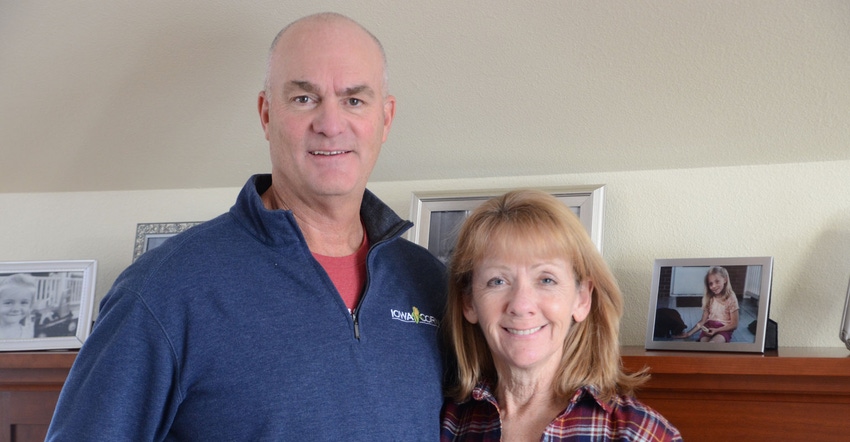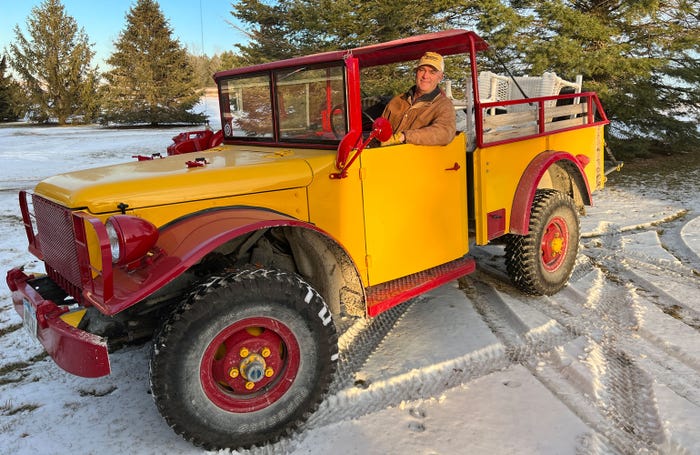March 15, 2022

A visit to Mark Mueller's farm office near Waverly, Iowa, is a kind of eye-opener. From an issue of The Economist on his desk to the book-filled shelves, it's apparent Mueller is a lifelong learner. He and his wife, Jeri, are fourth-generation farmers building for the future. And for Mueller, that involves being open to new opportunities.
Mueller raises diverse crops for the area, including specialty soybeans for Japanese consumers, corn and alfalfa for a local 600-cow dairy, ryegrass for cover crop seed — and even a special corn used by racing pigeons. He's converted the farm to no-till and is concerned about soil health on his farm.
Those books also show Mueller is a student of history. "We could raise anything here 100 years ago," Mueller says. "The land around this house at one time had sugarbeets on it, and there was a sugarbeet factory in Waverly."

He notes that his grandfather used to drive a team of horses pulling a wagon taking beets to the local processor in Waverly. "We could raise sugarbeets here today, but the nearest processor is 250 miles away in Minnesota somewhere," he says. "We can grow anything here, but economics pushes us toward corn and soybeans and the animals that eat those things."
Economics weigh in on those farm decisions. Take that ryegrass seed, for example. Mueller says he's raising it on perhaps 3% of his ground for seed, mostly to use in his own operation. "I'm trying to diversify a little away from corn and soybeans," he says "In some ways, it's cover crops. It's not a big moneymaker, but [with] what I would pay for seed I might as well raise it myself, then plant it for myself."
He adds that he sells some seed to neighbors if he has any left over. "It works out economically," he says.
Business expansion opportunity
About 16 years ago, through an Iowa State University market development program, Mueller was contacted to sell some land to a young Dutch couple coming from the Netherlands to start anew. "They had sold their herd in Europe and wanted to come to America to dairy," he says.
Long story short, the Dutch farm has expanded to a 600-cow dairy; the original farmers brought over a brother and his family. "They at one time had seven children in local schools that we wouldn't have had otherwise," Mueller points out. "And that 20 acres of cropland is much better on the tax roles as a dairy."
It's that eye toward economics that drives Mueller. The dairy doesn't have cropland. Instead, Mueller provides corn for silage, and alfalfa for the operation. In return, he gets access to quality manure for his cropland. "I plant the corn and spray it, but they handle the harvest," Mueller says. "The same goes for the alfalfa — they chop the crop."
He's tried other diversifications, like adzuki soybeans. They're a smaller soybean with a reddish-brown color and are used for different desserts in Japan. Mueller even traveled to Tokyo as part of an Iowa-sponsored program to promote crop diversity. The aim was to learn more about the opportunity. While there was a market for a short time, in the end the diversification didn't play out, though there was some short-term profit.
One diversification Mueller has is a specialty corn used to feed racing pigeons. Mueller has one customer for the crop, and he has to store the corn until the buyer wants it. But the lower-yielding crop is priced in a way that the business offers an opportunity for his farm. Scrambling for a better return has paid off for Mueller in his operation.
Investing beyond the farm
While Mueller has continued the tradition of running a profitable farm, he's also working with groups on ways to keep building markets. Mueller is involved with the Iowa Corn Growers Association as a district director and is chair of ICGA's Exports and Grain Trade Committee. He has chaired the U.S. Grains Council's Western Hemisphere Committee, and after his term expired, remains active with the committee. The aim is to promote trade and new opportunities for marketing corn around the world.
When Farm Progress visited Mueller, he was packing for a trip to Mexico: "I'm going to talk to grain buyers down there about their concerns regarding corn quality."
Every time a bushel of grain is handled, Mueller explains, its quality declines; and in his role at the U.S. Grains Council, Mueller has to field some of those complaints. Add in that Brazilian corn quality is higher, along with a weaker currency, and the global market is plenty competitive.
He's seen some interesting examples growing export markets for products like dried distillers grains. He tells the story of a company in Vera Cruz, Mexico, that processes rice and sends rice hulls out to livestock producers as feed. This company heard about DDGs and reached out to the U.S. Grains Council for more information. They ordered 4,000 tons of product as a test.
"When we visited there, soon after the product was delivered, we saw they had it in a huge warehouse and were shoveling it into bags," Mueller says. "They say they had small cattle producers who might buy 10 bags at a time but couldn't afford a truckload."
The business, which mushroomed overnight, ordered 40,000 tons on the next order. "And I think that their orders have grown by a multiple of 10, all from just one U.S. Grains Council conversation," he says.
This off-farm travel and corn promotion work is often scheduled outside when he needs to be working on the farm. He has help from wife Jeri and his father as needed to keep the operation going. That partnership has allowed Mueller to reach out and do that market development work.
For Mueller, this work also shows the value of the corn checkoff in promoting new market opportunities. What he sees is the need to keep pushing on ways to boost demand. It's not easy, but this Master Farmer is doing his part.
About the Author(s)
You May Also Like






